Test: Biology - 1 - UPSC MCQ
20 Questions MCQ Test Science & Technology for UPSC CSE - Test: Biology - 1
Consider the following statements about Vechur cattle breed
1. Vechur is the world’s largest cow.
2. It is indigenous breed found in Kerala.
3. Its milk protein has medicinal value.
4. Commonly used in farming as draught animal.
Q. Which of the statements given above are correct?
1. Vechur is the world’s largest cow.
2. It is indigenous breed found in Kerala.
3. Its milk protein has medicinal value.
4. Commonly used in farming as draught animal.
Consider the following statements:
1. Warm-blooded animals can remain active in cold environment in which cold-blooded animals can hardly move.
2. Cold-blooded animals require much less energy to survive than warm-blooded animals.
Q. Which of the statements given above is/are correct?
1. Warm-blooded animals can remain active in cold environment in which cold-blooded animals can hardly move.
2. Cold-blooded animals require much less energy to survive than warm-blooded animals.
| 1 Crore+ students have signed up on EduRev. Have you? Download the App |
Consider the following statements:
1. Human beings have 23 pairs of chromosomes.
2. Sex chromosome in human male is named XX.
3. Chromosomes are best seen in metaphase.
Q. Which of the statements given above are false about chromosomes?
1. Human beings have 23 pairs of chromosomes.
2. Sex chromosome in human male is named XX.
3. Chromosomes are best seen in metaphase.
Match List-I (animals) with List-II (class/ phylum) and select the correct answer from the codes given below:
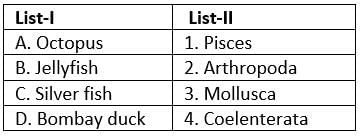
Which of the following professionals are more likely to run the risk of a permanent change in their cell’s DNA?
1. Researchers from carbon-14 isotope
2. X-ray technician
3. Coal miner
4. Dyer and painter
Q. Select the correct answer from the codes given below:
Consider the following statements about gene
1. Word ‘Gene’ was given by Johanssen.
2. Genes are situated on chromosomes.
3. Genes located at different locus and having different expression are multiple alleles.
Q. Which of the statements given above are true?
Consider the following statements:
1. Frogs can breathe by lungs as well as skin.
2. Gills are not present in any stage of lifespan of frogs.
Q. Which of the statements given above is/are correct?
Consider the following statements:
Assertion(A): In humans, female sex is determined by XX-chromosomes.
Reason(R): Male sex is determined by YY-chromosomes.
With reference to the work of human kidney, consider the following statements:
1. After the waste is removed in the kidney, the cleaner blood is sent back through renal artery.
2. From Bowman’s capsule, the filtered liquid passes through tiny tubes where much of the glucose is reabsorbed and sent back to the blood in the renal vein.
Q. Which of the statements is/are correct?
Consider the following statements:
Assertion (A): Drinking of whisky increases the frequency of urination.
Reason (R): Alcohol intake speeds up the secretion of vasopressin in the body.
With reference to the human body, consider the following statements:
1. The production of somatropin goes up when a person exercises.
2. Men’s testes produce progesterone.
3. Women’s adrenal glands secret testosterone.
4. Stress causes the adrenal to release very less amount of cortisol than usual.
Q. Which of these statements are correct?
Match List-I with List-II and select the correct answer from the codes given below:
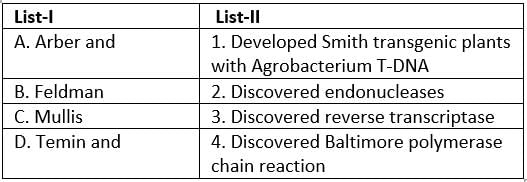
Consider the following statements:
Assertion (A): Human diet should compulsorily contain glycine, serine and tyrosin.
Reason (R): Essential amino acids can’t be synthesized in the human body.
Oxygen transportation in a human body takes place through
1. Blood
2. Lungs
3. Tissue
The correct sequence of transportation is
Consider the following statements:
Assertion (A): Scientists can cut apart and paste together DNA molecules at will, regardless of the source of the molecules.
Reason (R): DNA fragments can be manipulated from restriction endonucleases and DNA ligases.
Consider the following statements:
Assertion (A): ‘DNA fingerprinting’ has become a powerful tool to establish paternity and identity of criminals in rape and assault cases.
Reason (R): Trace evidences, such as hairs, saliva and dried semen, are adequate for DNA analysis.
Which of the following sectors is not included in the NITI Aayog’s focus regarding “National AI Strategy”:
1. Agriculture
2. MSME
3. Education
4. Infrastructure
5. Oil and Natural Gas
Select the correct code:
Match List-I with List-II and select the correct answer from the codes given below:
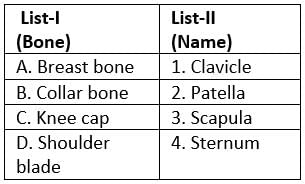
Match the hormones in List-I with items in List-II and select the correct answer from the codes given below:
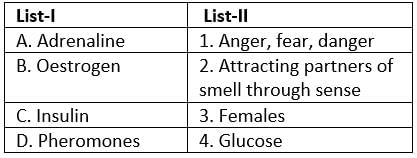
Match List-I with List-II and select the correct answer from the codes given below:
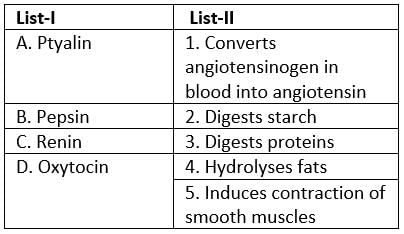
|
133 videos|399 docs|221 tests
|
|
133 videos|399 docs|221 tests
|

















